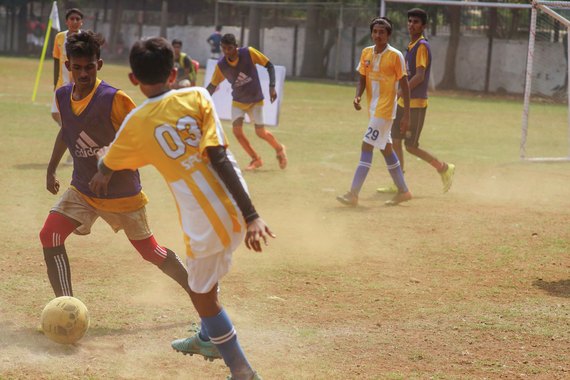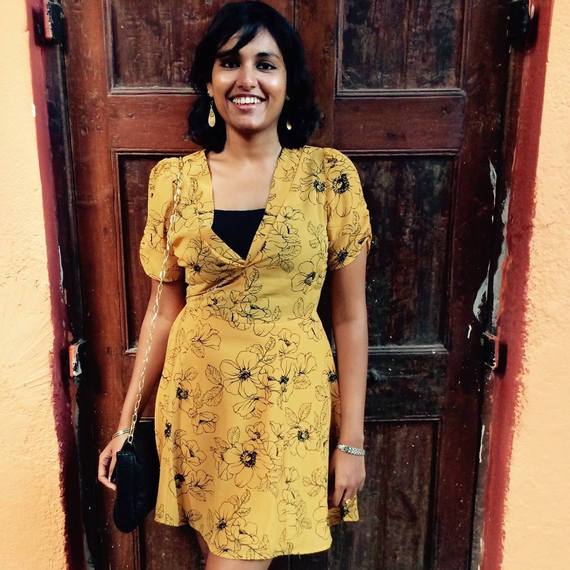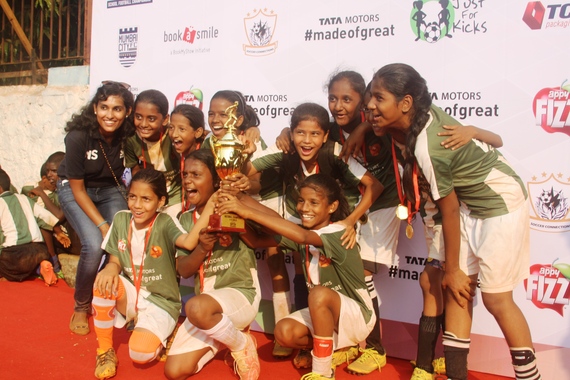This article originally appeared in Huffington Post on the 12th of April, 2016. Written by Suraj Katara
It is the concluding day of the two-month-long School Football Championship 2016, one of the biggest interschool football tournaments in India with 225 teams representing a mix of low-income government and private schools as well as elite international schools from Mumbai, Pune, Bangalore and Hyderabad. I am welcomed by cheering crowds and screaming coaches as I make my way towards Neha Sahu–Teach For India alumnus and co-founder of Just For Kicks–who is emceeing for the event and lining up the Shindewadi Superheroes, the participating team from Shindewadi Municipal Public School. “A lot of what I have accomplished is thanks to the kids I taught–and who taught me–in Shindewadi during the two years of my Fellowship,” she smiles as the walkie-talkie in her hand crackles.
Neha graduated in 2010 from New York University with a BSc in Psychology and a minor in Media & Communication. After having experienced inequity in its various forms through volunteer work with low-income African and Hispanic communities during her second year, she felt compelled to come back to Mumbai and decided to apply for the Teach For India Fellowship in 2010. “My first two months were spent just getting the 47 second-graders to sit down on their benches. It was only after a year that I felt like I was creating milestones with my kids,” she reminisces. Neha’s day as a Fellow would start at 9am and comprised a schedule of extra-curricular activities as well as rigorous academic pursuits geared to achieve the vision for a holistic education. “We did not have free resources to realize this vision and that’s what led us to secure partnerships with others.”
The idea was to use the sport to develop essential life skills and academics in children who were not doing well in their studies…
It was in 2011 that Neha co-founded Just For Kicks–an initiative that provided kids from low-income schools a platform to play football and apply learnings from the experience to academics. “Just For Kicks happened very organically because Shindewadi is a football hub in Bombay. Our sixth grade team could easily take on kids four or five years older than them. Kids who would refuse to attend class would never skip football so I started teaching them math and English using the rules and principles of the game and at the same time recruited volunteers to aid their sport training. The idea was to use the sport to develop essential life skills and academics in children who were not doing well in their studies,” she says.
While Neha was paving the path to form a solid team, other Teach For India Fellows in Pune were simultaneously building a project to facilitate leadership skills through sports. “We came together because of our shared belief and it eventually led to the creation of 14 football teams that participated in our first league match in Pune. While driving back, after my Shindewadi team having performed so well there, I remember thinking to myself that I’ll have to continue with Just For Kicks!”
Neha, along with co-founder and another Teach For India Alumni Vikas Plakkot continued to work on Just For Kicks even as their Fellowship came to an end. “We evolved by learning from sport curriculums in different universities across the world and then progressed to creating our own curriculum, hiring our own coaches and also having an app to record player feedback and attendance.”
Within one year, the kids were displaying better behaviour in class, showing more confidence and dealing with loss in a disciplined way.
JFK became a registered NGO in 2015 and today–5 years after it all began–there are more than 160 participating teams from Teach For India as well as other miscellaneous low-income private and government schools. JFK also offers in-school training programs which have been implemented by 60 schools and is impacting 1600 children across Mumbai, Pune, Bangalore and Hyderabad.
When asked about the most challenging stakeholders to the JFK journey, Neha exclaims, “Definitely school management! Most schools in India view sports as an add-on and have very few resources or sports equipment to supplement it. There is usually just one physical trainer in each school who takes up activities like jumping jacks and spoon and lemon race etc. Very few understand how fruitful sport can be when teaching values such as leadership, discipline, team work and even coping with academics. Fortunately our school retention rate is excellent because within one year, the kids were displaying better behaviour in class, showing more confidence and dealing with loss in a disciplined way–the schools couldn’t help but take notice!”
There is plenty of raw talent in the low-income communities of India and these kids deserve to receive the same skills and training as anyone else.
Football is gaining tremendous popularity in India, especially with the Indian Super league which was viewed by 429 million viewers last season–two and a half times that of FIFA World Cup 2014. Just For Kicks definitely aims to capitalize on the growing popularity of the sport. “Vikas and I are passionate about getting everyone to play irrespective of their social or economic background and want Just for Kicks and the School Football Championship to grow exponentially every year. We are also seriously committed to putting up a national girls’ team one day and are collaborating with a for-profit organisation called Soccer Connections to provide training and coaching. There is plenty of raw talent in the low-income communities of India and these kids deserve to receive the same skills and training as anyone else,” says Neha.
From getting low-income schools to play on the same pitch as the elite school, to partnering with an English Premier League Club and even having ex Manchester United player Louis Saha distribute prizes at the closing ceremony of SFC–Neha has indeed come a long way. Talent can be found in the most unexpected of places regardless of socio-economic background. With organizations like Just For Kicks gaining momentum, the possibilities for children of our nation can be limitless.
Original Article




